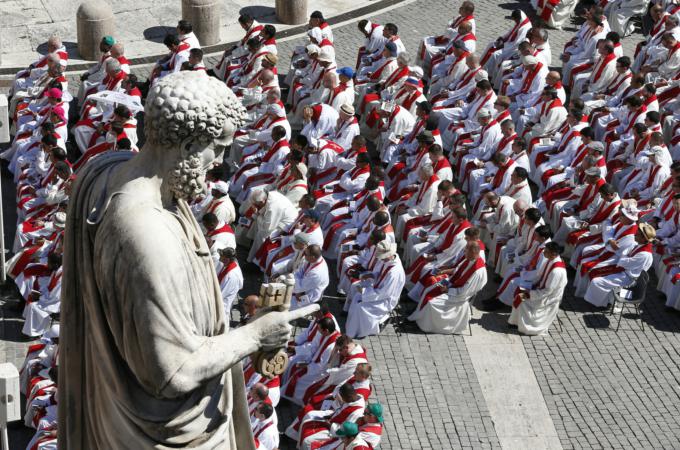Sex abuse and clericalism
The sex abuse crisis that began with allegations about Archbishop Theodore E. McCarrick and dioceses in Pennsylvania has broadened with a testimonial by the former papal nuncio to the United States, Archbishop Carlo Maria Vigano.
If Archbishop Vigano's charges are true, Archbishop McCarrick's crimes were known to several U.S. bishops and high Vatican officials -- yet he was permitted to function as a cardinal and even as a trusted adviser in naming new bishops.
I've written about how our culture's "sexual revolution" undermined commitment to the Church's moral teachings among laity, clergy and even seminary professors in the 1970s, followed by a tragic increase in sexual offenses by seminarians and priests (and, we now know, some bishops). But another factor helped drive the enabling and cover-ups by others.
It's called clericalism. It goes beyond recognizing a special priestly office -- a solemn calling to preach the Gospel and provide the sacraments, most centrally to act for Jesus Christ himself in nourishing us with the Eucharist.
Clericalism separates out the clergy as a privileged caste, in a mutual bond that excludes others and invites the laity to be mere passive recipients of what the clergy offers. It fosters exclusivism and mutual protection as ends in themselves, so the first instinct when a priest is accused of wrongdoing is to "circle the wagons" for protection.
A fine indictment of clericalism is the 1993 book "To Hunt, To Shoot, To Entertain" by Russell Shaw, once public affairs director of the U.S. bishops' conference. His ironic title quotes a 19th-century monsignor's description of "the province of the laity."
But the province of the laity is the same as that of every member of the Church: to be holy. As the Second Vatican Council declared in the Dogmatic Constitution on the Church, "Lumen Gentium":
"The classes and duties of life are many, but holiness is one -- that sanctity that is cultivated by all who are moved by the Spirit of God, and who obey the voice of the Father and worship God the Father in spirit and in truth. ... Every person must walk unhesitatingly according to his own personal gifts and duties in the path of living faith, which arouses hope and works through charity" (No. 41).
Most of us do not have a vocation to be a priest (and someone who thinks his destiny is to be pope is likely a bad candidate). But we should all aspire to follow the universal call to holiness.
So the mission of the Church is not so much to make bishops as to make saints. And sometimes saints have had to tell even the pope that he is failing in his sacred duty -- as when St. Paul upbraided St. Peter for not fully embracing the mission to the gentiles (Galatians 2) or St. Catherine of Siena urged Pope Gregory to reform the clergy and return to Rome from Avignon.
Bishops are called to teach and inspire us to be holy. So we rightly have a special horror at a bishop abusing those under his care, or knowingly permitting this to continue. Such false leaders do not act for the Church but betray the Church as well as the innocent. Times like these call the laity to fulfill their own vocation to live and promote a holy life.
Cardinal Daniel N. DiNardo, president of the U.S. bishops' conference, has rightly said that the much-needed investigation into this crisis requires "substantial involvement of the laity." We laypeople are also needed to strengthen and encourage good and holy priests and bishops, and help reform dangerous attitudes and policies, so the Gospel will continue to be a light to the nations.
- Richard Doerflinger worked for 36 years in the Secretariat of Pro-Life Activities of the U.S. Conference of Catholic Bishops. He writes from Washington state.



















